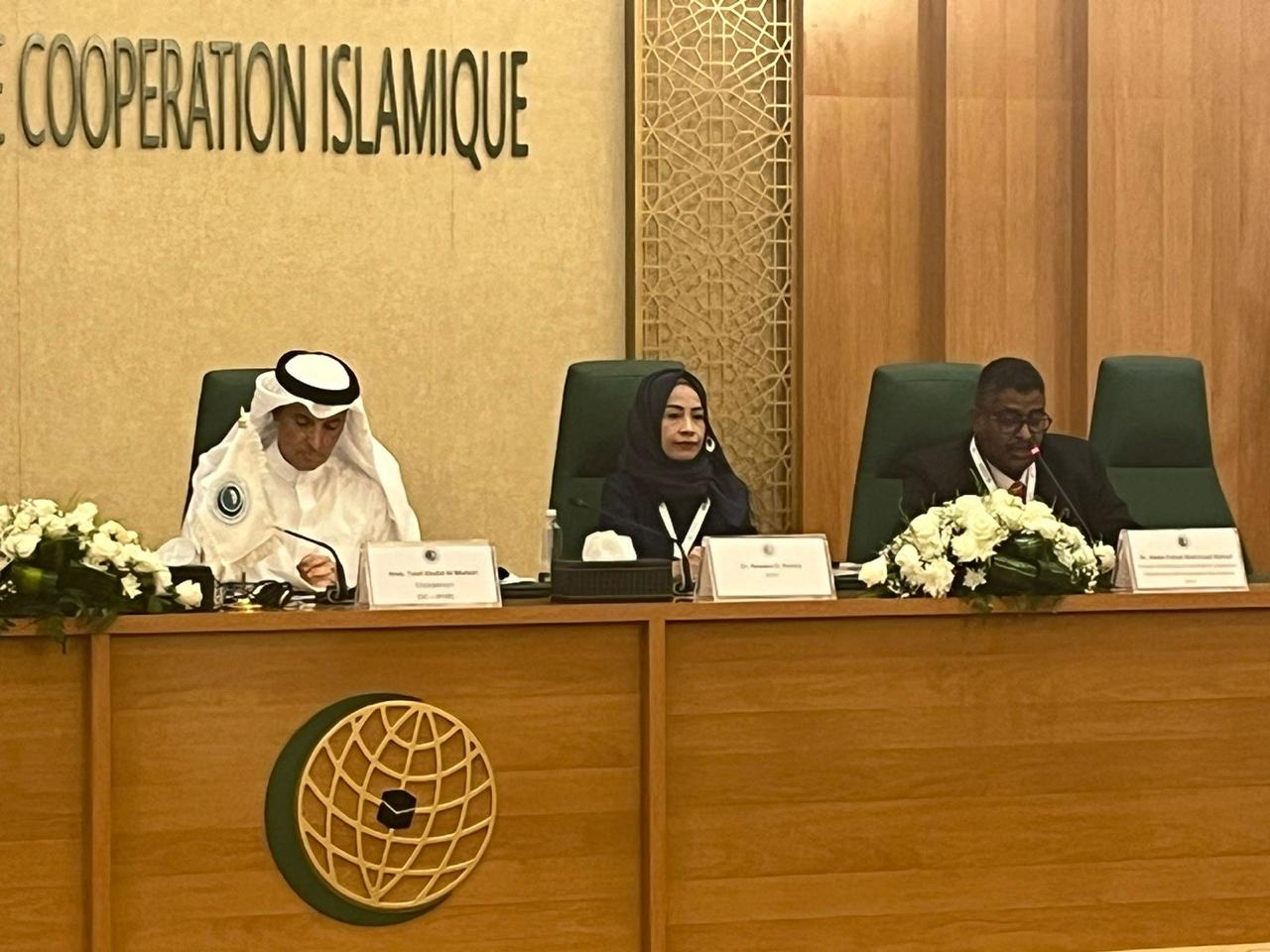
In response to the invitation of the OIC’s Independent and Permanent Human Rights Commission for Human Rights, Dr. Abdulfatah Mahmoud Abnaouf, Director of the Department of Planning and International Cooperation, represented the Secretary General of the Academy, and presented a scientific paper at the 23rd Ordinary Session of the OIC’s Cultural Commission on “The Impact of Artificial Intelligence (AI) on Human Rights: Challenges and Opportunities”, on Sunday 24 Dhul Hijja 1445, corresponding to 30 June 2024, at the OIC’s headquarters in Jeddah.
Dr. Abnaouf began his presentation at the first session, which was entitled “International and Islamic Human Rights: A Normative and Sharia Perspective on Artificial Intelligence”, by expressing his thanks and appreciation to the Independent Permanent Commission for organizing this conference on this critical topic, reflecting its constant and diligent attention to everything related to the field of human rights. He then spoke about the rulings of Sharia and its noble principles aimed at achieving the happiness of man through any scientific development that leads to enhancing his abilities to realize the principle of prosperity on the earth by giving due importance to our rich intellectual heritage, which counts among its ranks great values based on serving mankind, eliminating embarrassments and difficulties, and the willingness to facilitate their life and mission. He stressed that Islamic jurisprudence is compatible with all aspects of life, and that no incident or fact not addressed in the Quran and Sunnah, as Imam Al-Shafi’i said: “Indeed, no calamity befalls any follower of God’s religion without there being guidance in God’s Book on the path to righteousness in dealing with it.“
Dr. Abnaouf pointed out that AI is, in fact, part of human intelligence and that human intelligence is the one that produced it, that it has detached itself from it and today surpasses the master that created it and could perhaps replace it in the near future. Therefore, we must activate the optimal values to guide the behavior of those working on the development of this software so that these ethics and values are governed by major objectives that achieve the preservation of humanity, fulfill the five objectives of Sharia that carry within guidelines and intents that guide and direct behavior on the basis of the foundational texts of Islam in response to this novelty, and the maxims of fiqh that guide new issues in religion, while taking into account the consequences and arbitration of interests as well as the disadvantages emerging from the rapid development of AI applications in various areas of life and the diversity of applied knowledge and natural sciences.
He then addressed the impact of AI on human rights, and establishing guidelines and foundations through which the greatest gains of this intelligence could be made in the field of human rights. To achieve this, we need to take into account the five Sharia objectives in the context of AI, which can represent the framework to verify and protect this intelligence and make it an intelligence at the service of man, as his natural intelligence and real intelligence do. Although this new technology was not born in our countries and in our homes, today it has become one of the facilities that can be added to God’s infinite bounties. The foundation stone of AI began from these complex sciences, mathematics, and algorithms, and so on, are but the product of a great Islamic historical foundations and a legacy laid by great Muslim scientists such as Ibn al-Haytam. Dr. Abnaouf stressed that these complex sciences, mathematics and algorithms are the product of a great Islamic historical foundation and the legacy of great Muslim scientists such as Ibn Al-Haytham, al-Khwarizmi, who founded modern mathematics, and others who were ahead of their time in this field. However, at the same time, this new innovation can turn into a curse, God forbid, and we fear that it would have a destructive impact on the individual and society.
He then stressed that if we look into this intelligence through these lenses, we can put in place guidelines that prevent it from becoming a tool of destruction in our societies by avoiding that it harms and corrupts the soul and what negatively affects human diversity so as to preserve honor and family, and to prevent the infringement of the rights of others, seeking to defame or destroy them in their future or to cause harm to their private life. It shouldn’t be used in a way that undermines religion, but rather make it a way to promote awareness of the teachings of our faith, to promote awareness of human rights and the provisions that reinforce them under our Sharia, such as adhering to the profound Islamic ethics and principles.
Dr. Abnaouf concluded by saying that, “We want this intelligence to be at the service of the human being, to help them achieve the five objectives of Sharia and their outcomes, to be at the service of our religion, to preserve our properties and wealth, our spirit and our faith. This intelligence then becomes what we call our merchandise that has been returned to us.”
It is worth mentioning that the Academy has chosen this topic on the agenda of its twenty-sixth session to be held in Qatar in November 2024 because this subject concerns the most important element, which is the human being, whom God created to prosper within the earth and to benefit from it for his happiness in this world and the hereafter. In order to achieve such goals, we should study the extent to which humanity can benefit from AI in the elaboration of regional and international laws, guidelines, and initiatives that keep pace with the efforts of scholars in adapting this newcomer in a way that preserves, safeguards and cares for human rights in OIC member states and beyond.
Read Also
Lastest








